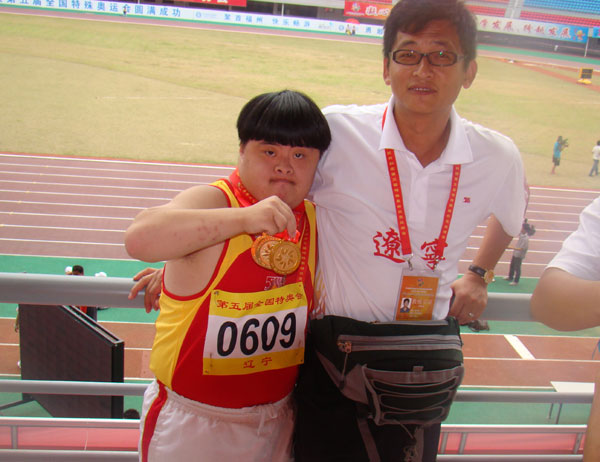Society
The games of true champions
By Tang Yue (China Daily)
Updated: 2010-09-30 08:28
 |
Large Medium Small |
 |
|
Su Fang poses with his coach Xu Guangsong after winning gold in the men's 50m sprint. [Lu Cheng / for china Daily] |
Changing attitudes
According to China's population census in 2000, roughly 13 million residents have intellectual disabilities. The number could even be as high as 39 million if measured by the standards in developed countries, where it is estimated that 3 percent suffer mental disabilities.
"Even if we take the figure of 13 million, only less than one-tenth of those with learning difficulties are involved in the Special Olympics movement in China," said Jia Yong, executive chairman of the China Special Olympics Committee and director of sport under the Chinese Disabled Persons' Federation. "There is so much work to do."
Although sport plays an important role in daily life, he complained that even some federation members still cannot tell the difference between the Paralympics and Special Olympics.
"If we don't work harder and if society doesn't give enough support, the gap between able-bodied athletes and those with intellectual disabilities will get bigger, not smaller," said Jia, whose department is in charge of all sports programs for China's 82 million disabled people.
One bottleneck is the lack of professional sports teachers.
Lu Yan, coordinator for the Special Olympics University Program in China, organized a clinic this summer at Beijing Sports University for more than 60 physical education teachers from special schools across China. She said almost half of them only knew a little about the Special Olympics and most of them needed more professional training.
"The US established a professional standard in adapted physical activity in the 1970s and Europe did so in 1990s, yet China still has no such standard," she said. "This needs to be changed.
"You can't help a child with special needs to fully reach his potential without a professional background."
Changing general attitudes towards the disabled is arguably far more urgent, however. Experts say that too will take a long time.
To make this happen, the Special Olympics University Program includes 136 Chinese colleges, featuring various promotions and lectures (about 20 universities have even made attendance compulsory).
"Society is much more civilized than in the past and we hear less unpleasant words (about the disabled) today but we need more than that," said Lu. "We hope everyone, especially young people, will take the initiative to make friends with disabled people, not to sympathize but to appreciate."
Yang Jinxu is among those ready to push the cause.
The devoted mother, who works with a federation for the disabled in Dalian, admitted she was initially reluctant to be interviewed by media reporters as the mother of a man with Down syndrome but now wants to share her family's story with others.
|
||||
As for Su, he said he is still not tired of that winning feeling.
He now has his sights set on going for gold in the 10-pin bowling event (his average is 140 points per game) at next year's Special Olympics World Games in Athens, Greece.
In the meantime, he will be busy managing his caf in Dalian, which was made possible by charitable donations.
Along with several professional staff, Su has already taken on five disabled employees and said he plans to expand his business and create even more opportunities for people like him.



